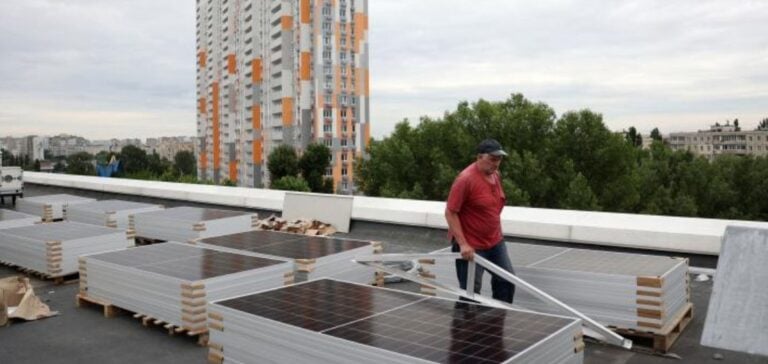In Ukraine, energy infrastructures have been severely hit by Russian bombardments, causing frequent power cuts. Faced with this critical situation, Ukraine is turning massively to solar energy to ensure a constant supply of electricity, especially for hospitals and schools. This new trend is supported by presidential directives and strong demand from private customers.
Transition to Solar Energy
Since the bombing intensified, Ukraine’s energy infrastructure has been struggling to function properly. Ukrainian President Volodymyr Zelensky recently ordered the rapid installation of solar panels in all health and education facilities. This measure is designed to guarantee a minimum of energy stability in the face of repeated attacks.
Nazariï Guitchka, director of a maternity hospital in Kiev, observes the installation of solar panels on the roof of his establishment. He stresses the importance of this initiative in keeping incubators operational and avoiding any interruption in care. The hospital had anticipated these needs as early as the end of 2022, in the midst of the first wave of bombing raids on energy infrastructures.
Impact on Daily Life
Installing solar panels isn’t just limited to institutions. Private customers are also flocking to this solution. Yuri Skoblikov, Sales Director at Solar Tech, reports a massive influx of orders from the very first power cuts. Ukrainian families are seeking to compensate for power grid failures by adopting renewable energy sources. In schools like Spilno in Kiev, solar panels have proved their worth. Not only do they keep school activities going, they also provide energy for local residents. Anastasia Kyslinska, the school’s headmistress, attests to the importance of these facilities for the community.
Towards an Energy Paradigm Shift
Before the war, renewable energies accounted for just 11% of Ukraine’s energy production. However, current circumstances are forcing the country to reconsider its energy mix. Dmytro Bondarenko, a researcher at the Institute of Renewable Energy in Kiev, sees this crisis as an opportunity to speed up the transition to renewable energies. The Ukrainian government is introducing tax incentives and loans to encourage citizens to adopt sustainable energy systems. These measures are designed to strengthen the country’s energy autonomy and reduce its dependence on fossil fuels.
Faced with an unprecedented energy crisis, Ukraine has found a viable and sustainable solution in solar energy. The rise in solar panel installations marks a turning point in the country’s energy management. This transition, supported by government initiatives and the mobilization of citizens, could well redefine Ukraine’s energy future.






















